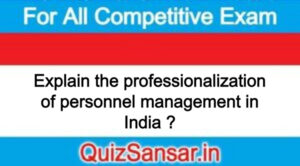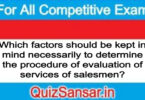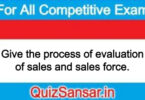
Explain the professionalization of personnel management in India ?
Explain the professionalization of personnel management in India ?
Ans.
Professionalization of Personnel Management in India
According to George Liker and Harison Trice, “Although personnel managers share a degree of educational qualification, commonality of commitment to the occupation and an emphasis on integrity and independent action, the level of profession is certainly not of the order off that found in law and medicine.”
Mr. S. N.. Pandey, has made the following suggestions for professionalization of personnel management in India:
(1) There is need on the part of employers and the organisation to grant the same status and recognition to the personnel man as they have granted to other professionals, and also give equal weightage to their advice. The personnel manager should be given freehand in the formulation of sound personnel policies and contribute their best to achieve the organisational goals.
(2) The trade unions should also recognise this profession as a speciality in the area of man management and deal with it accordingly. Firmness with fairness must replace the practice of appeasement of the trade unions without creating any misunderstanding.
(3) There is also need on the part of government to take a lead in professionalising personnel management in the public sector and set a model for others to follow. This is possible if government does not interfere in the day to day relations of workers and managers and give freehand to personnel managers to handle the situation on their own. The Government may act as a watch dog to restrain, direct and guide the parties as and when needed.
In India, profession of personnel management is regulated by Indian Institute of Personnel Management, Kolkata and National Institute of Labour Management, Mumbai. These have merged and formed a new institute known as National Institute of Personnel Management. This institute should regulate the profession of personnel management in India.
The National Institute of Personnel Management has named a code of ethics for its members, to regulate the profession of personnel management in India. The nature of the code in detailed form are reproduced below:
Recognising and accepting the responsibilities of the profession of personnel management, I as a member of the National Institute of Personnel Management, shall:
Uphold the honour and dignity of the profession and the Institute;
Observe and maintain integrity as keynote of professional conduct and shall perform my professional duties with fairness, impartiality, fidelity and dedication to the cause of the profession;
Recognise and accept the dignity and worth of an individual as a human being irrespective of race, religion, language, casts or creed, and strive for the development of his personality:
Cooperate in maximising the effectiveness of the profession by exchanging freely information and experience with others and by contributing to the development of profession to the best of my ability;
Maintain at all times an open mind with regard to problems that I have to deal with in the course of my work and approach the problems of others with understanding;
Not allow any interest other than professional to interfere with my official work;
Strive decreasingly for self-development by acquiring ever increasing knowledge, skill and experience related to the profession.
Endeavour to extend public knowledge on professional matters and try to eliminate misconceptions and misunderstandings about the profession.
Express publicly an opinion on professional matters only when it is founded on adequate knowledge and honest conviction;
Not damage, directly or indirectly, the professional reputation or practice of other members;
Endeavour to give credit for professional work to those to whom it is due;
Endeavour to provide opportunities for the development and advancement of professional men who work with me;
Uphold the principles of appropriate remuneration for those engaged in. professional work;
Not associate in work with another member who does not conform to ethical standards and not hesitate to bring to the notice of the Institute any unethical practice adopted by any member of the Institute;
Be faithful to my employer or client, and present clearly to the employer or client the consequences to be expected if my professional if my professional advice is not accepted;
Advise engagement of specialists when I am convinced that such services are in the best interests of my employer or client and shall cooperate with them in their works;
Follows professional principles and practices tactfully and courageously keeping in mind the principles of equity in the fair distribution of work and rewards;
Promote the concepts, methods, skills and techniques in the field that contribute to productivity, growth, profitability and employee satisfaction,
Not disclose any information of a confidential nature that I may acquire in the course of professional work without obtaining the consent of those concerned; and
Not accept or offer any improper gratification in any form or manner whatsoever in connection with or in the course of my professional work.






